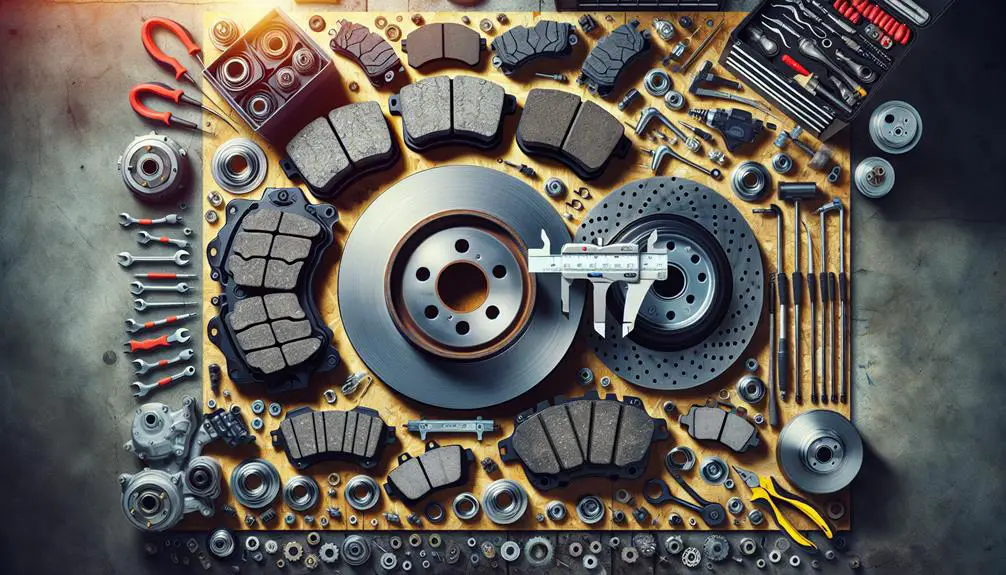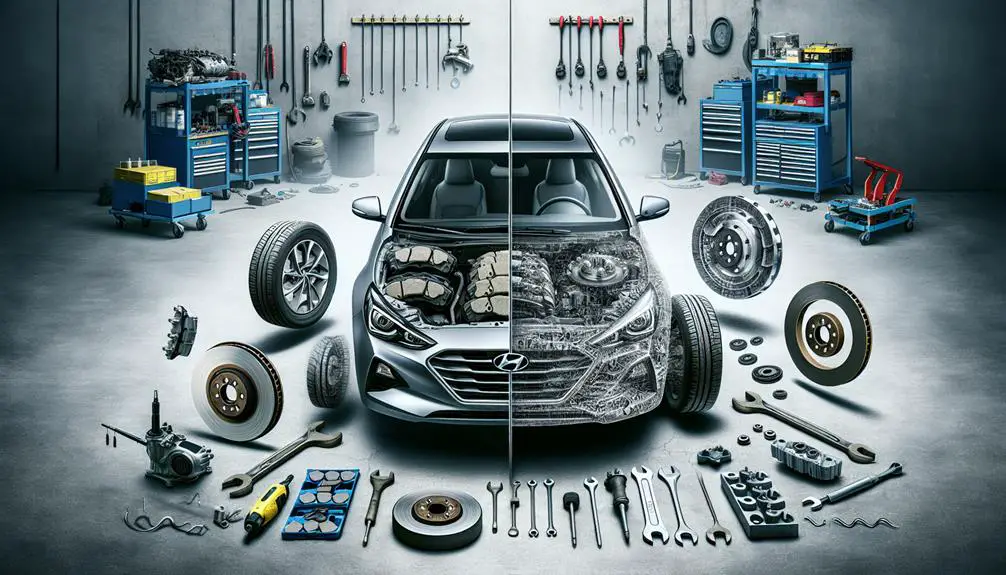Choosing the right Hyundai brake pads and rotors can significantly impact braking performance and noise levels.
When it's time to replace these components, consider factors like durability, noise reduction, and cost-effectiveness.
Tailoring your choice to your driving habits is essential for maintaining your Hyundai's braking system and enhancing safety and driving experience.
Understanding Brake Pads and Rotors

Brake pads and rotors are vital components of your Hyundai's braking system, converting kinetic energy into heat to stop your vehicle. They work together to guarantee your safety, but they function in slightly different ways. Let's explore how these parts play an important role in your driving experience.
Your Hyundai's brake pads are the friction material pressed against the rotors. When you press the brake pedal, hydraulic fluid pushes the brake caliper pistons, which then apply pressure to the brake pads. This pressure creates the friction needed to slow down and eventually stop your car. Brake pads are typically made from a variety of materials, including metallic, ceramic, and organic compounds. Each type offers distinct advantages in terms of performance, noise, and dust production, so you'll want to choose the right one for your driving needs.
Rotors, or brake discs, are the metal discs that the brake pads clamp down on to stop the car. They're connected to your Hyundai's wheels, spinning at the same speed. When the brake pads press against them, the friction slows the rotors, and therefore, the wheels. Rotors can be solid or vented, with vented ones being better at dissipating heat. This is crucial since the braking process generates a lot of heat, and excessive heat can lead to brake fade, reducing the effectiveness of your brakes.
Comprehending these components can help you appreciate the complexity of your Hyundai's braking system and the importance of keeping these parts in good condition.
Signs of Wear and Tear
Recognizing the signs of wear and tear on your Hyundai's brake pads and rotors is crucial for maintaining top safety and performance. As you drive your vehicle, these components gradually deteriorate, but knowing when they need attention can save you from potential hazards and costly repairs down the line. Let's delve into the tell-tale signs that your brakes might be due for a check-up or replacement:
- Unusual Noises: If you're hearing high-pitched squealing or grinding sounds when you apply the brakes, it's a clear indicator that your brake pads are worn down. The squeal is usually caused by a metal shim, known as an indicator, which is exposed once the pads wear to a certain point. Grinding may suggest that the pads have been worn down completely, causing metal-to-metal contact.
- Vibrations: Feeling a vibrating or pulsating sensation through the brake pedal or steering wheel when you brake? This often points to warped rotors. Warping can occur due to overheating from excessive use or from long-term wear and tear.
- Reduced Responsiveness: If your brakes aren't as responsive as they used to be, or if the pedal sinks towards the floor more than usual, it could indicate a leak in the brake system – either air in the brake lines or a brake fluid leak.
- Wear Indicator Light: Many modern Hyundai models come with a brake wear indicator light on the dashboard. If this light illuminates, it's a straightforward signal that your brake pads need looking at.
Being vigilant about these signs and acting promptly can ensure your Hyundai remains safe to drive, keeping you and your passengers secure on the road.
Choosing the Right Replacements

After identifying signs of wear on your Hyundai's brake pads and rotors, it's important to know how to select the right replacements for peak performance and safety. The choice you make can greatly impact your vehicle's braking efficiency and durability. Here's a brief guide to help you make an informed decision.
To start, consider the material. Brake pads are typically made from ceramic, metallic, or organic compounds, each offering different benefits in relation to performance, noise, and wear rate. Rotors usually come in cast iron or composite materials. Your driving habits and conditions should guide your material choice.
Next, pay attention to compatibility. Make sure the replacements are specifically designed for your Hyundai model to guarantee a perfect fit and best functionality. Incorrect parts can lead to premature wear, reduced performance, and safety hazards.
To add depth to your selection process, here's a quick comparison to help you decide:
| Feature | Ceramic Pads | Metallic Pads |
|---|---|---|
| Performance | High | Very High |
| Durability | Moderate to High | High |
| Noise Level | Low | Moderate |
| Dust | Low | High |
| Cost | Higher | Moderate |
Moreover, don't overlook the importance of choosing quality brands known for their reliability and performance in Hyundai vehicles. Investing in superior quality brake pads and rotors not only ensures your safety but also saves money in the long run because of their durability and efficiency. Remember, your Hyundai deserves parts that match its quality and performance standards.
Maintenance Tips
To keep your Hyundai's braking system in top condition, it's vital to follow a few key maintenance tips. Regular upkeep not only guarantees the longevity of your brake pads and rotors but also maintains your vehicle's safety and performance. Here's how you can keep everything running smoothly:
- Regular Inspection: Make it a habit to check your brake pads and rotors for wear and tear every time you have your oil changed, or at least twice a year. Look for signs of uneven wear, cracks, or damage. Early detection can save you from more costly repairs down the line.
- Cleaning: Dirt, debris, and rust can significantly impact your brakes' performance. Cleaning your brake components, especially after driving in harsh conditions, can prevent buildup that might lead to damage. Use a brake cleaner spray and a soft brush to gently remove any harmful elements.
- Fluid Checks: Brake fluid is essential for the hydraulic system that powers your brakes. Make sure the fluid is at the proper level and check for any signs of leakage. If the fluid looks dark or dirty, it might be time for a change. Fresh brake fluid can greatly improve braking performance.
- Driving Habits: Your driving style can impact the lifespan of your brake pads and rotors. Avoid sudden stops and try to anticipate stops to apply brakes gently. Additionally, reducing your vehicle's load can lessen the strain on your brakes, extending their life.
Common Problems and Solutions

While maintaining your Hyundai's brakes is vital, you'll still encounter common problems that require specific solutions. One frequent issue is brake squealing. This annoying sound often means your brake pads are worn and need replacing. Don't ignore it; replacing pads is a straightforward fix and much cheaper than letting the problem escalate.
Another common problem is vibrating or pulsating when you apply the brakes. This usually indicates your rotors are warped. Warped rotors can result from excessive heat and stress from abrupt stopping. The solution? You'll need to have your rotors either resurfaced or replaced to ensure a smooth stop.
You might notice your car pulling to one side when braking. This could mean one of your calipers is stuck, causing uneven braking pressure. It's crucial to address this quickly to avoid uneven wear on your brake pads and rotors. The fix involves either freeing the stuck caliper or replacing it.
If your brake pedal feels spongy or soft, it's a sign there's air in the hydraulic system or your brake fluid needs replacing. Bleeding your brakes to remove the air or flushing the brake system and adding fresh fluid can resolve this issue.
Conclusion
In crucial, keeping your Hyundai's brake pads and rotors in top shape is crucial for your safety on the road. You've got to watch out for signs of wear and tear, choose the right replacements, and stick to regular maintenance.
If you run into common problems, don't worry—there are solutions. Remember, taking care of your brakes isn't just about avoiding repairs; it's about ensuring you and your loved ones stay safe every time you hit the road.